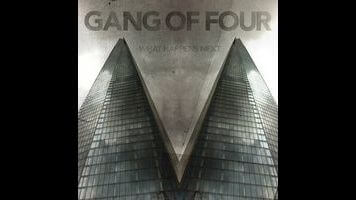Gang Of Four provokes indifference on What Happens Next

When bands lose a vocalist, it’s not necessarily a mortal wound—just ask Genesis, Van Halen, or Journey, who all soldiered on with replacements and continued to find success. But Gang Of Four losing frontman Jon King in recent years felt like a mighty blow; the vocalist’s discontented howls and pointed delivery had always boldly underlined the societal and cultural invective conveyed by guitarist Andy Gill’s knife-slash riffs. Without King’s snarling polemics at the forefront, Gang Of Four was destined to sound like a very different band.
What Happens Next, the band’s first album with new vocalist John “Gaoler” Sterry, is still a shock to the system. The record resembles the kind of industrial-tinged electro-rock albums released in the mid-to-late-’90s (think Stabbing Westward or God Lives Underwater), thanks to its reliance on churning electronic programming, distortion-coated guitars, and murky beats. “The Dying Rays” (which features debonair, Bowie-like German vocalist Herbert Grönemeyer at the helm) even echoes later-era Depeche Mode. Only the occasional outburst of frayed metallic guitars—notably on the disco-punk standout “Broken Talk” and the distorted psych-blues of “England’s In My Bones,” which both feature desperate vocals from The Kills’ Alison Mosshart—and crisp lyrics (which elegantly condemn commercial bloat, broken political systems, and digital emptiness) make the album recognizable as a Gang Of Four effort.
Of course, genre curveballs aren’t out of character for Gang Of Four; the band has spent the years since 1979’s post-punk totem Entertainment! experimenting with disco, electro, synth-pop, and funk. And this drastically different instrumentation itself isn’t the problem, especially since new vocalist Sterry—who relies on nuance rather than stridency for effect—is a good fit for this direction. However, What Happens Next’s overall lack of aggression and bite drains the urgency from the lyrics, and the surprisingly retro-leaning music makes the album feel like a tired retread rather than a new beginning. Even when the band was flouting its own legacy, Gang Of Four at least felt engaged and energized by the defiance. This record foments no curiosity, just indifference—and for a band built on commanding attention for its politicized music, it’s a bitter pill to swallow.